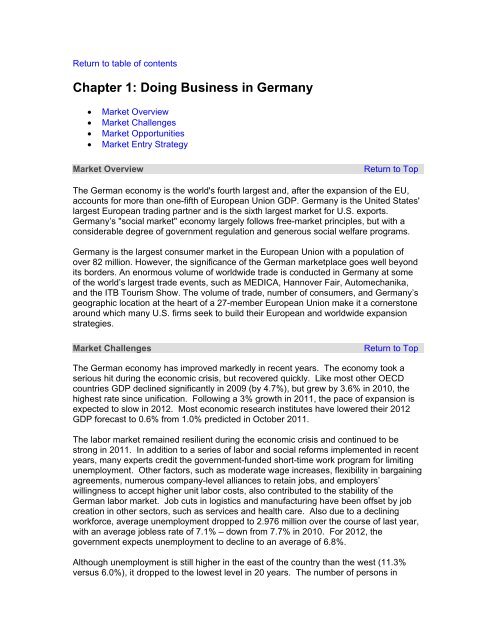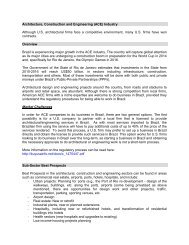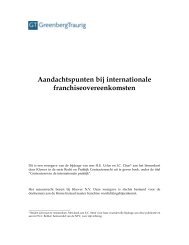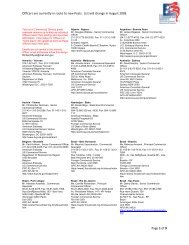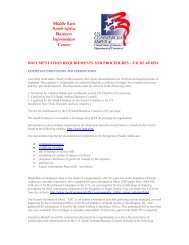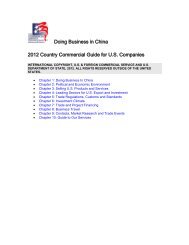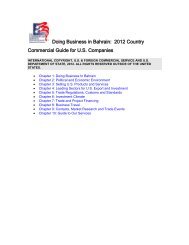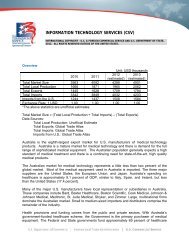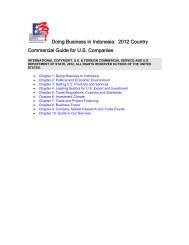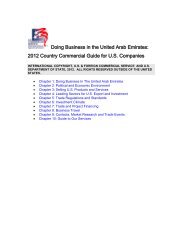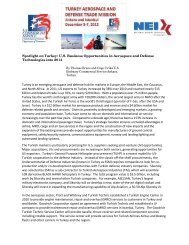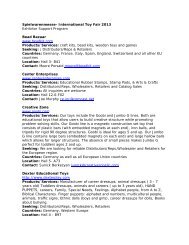Doing Business In Germany: A Country Commercial ... - Export.gov
Doing Business In Germany: A Country Commercial ... - Export.gov
Doing Business In Germany: A Country Commercial ... - Export.gov
Create successful ePaper yourself
Turn your PDF publications into a flip-book with our unique Google optimized e-Paper software.
Return to table of contents<br />
Chapter 1: <strong>Doing</strong> <strong>Business</strong> in <strong>Germany</strong><br />
• Market Overview<br />
• Market Challenges<br />
• Market Opportunities<br />
• Market Entry Strategy<br />
Market Overview Return to Top<br />
The German economy is the world's fourth largest and, after the expansion of the EU,<br />
accounts for more than one-fifth of European Union GDP. <strong>Germany</strong> is the United States'<br />
largest European trading partner and is the sixth largest market for U.S. exports.<br />
<strong>Germany</strong>’s "social market" economy largely follows free-market principles, but with a<br />
considerable degree of <strong>gov</strong>ernment regulation and generous social welfare programs.<br />
<strong>Germany</strong> is the largest consumer market in the European Union with a population of<br />
over 82 million. However, the significance of the German marketplace goes well beyond<br />
its borders. An enormous volume of worldwide trade is conducted in <strong>Germany</strong> at some<br />
of the world’s largest trade events, such as MEDICA, Hannover Fair, Automechanika,<br />
and the ITB Tourism Show. The volume of trade, number of consumers, and <strong>Germany</strong>’s<br />
geographic location at the heart of a 27-member European Union make it a cornerstone<br />
around which many U.S. firms seek to build their European and worldwide expansion<br />
strategies.<br />
Market Challenges Return to Top<br />
The German economy has improved markedly in recent years. The economy took a<br />
serious hit during the economic crisis, but recovered quickly. Like most other OECD<br />
countries GDP declined significantly in 2009 (by 4.7%), but grew by 3.6% in 2010, the<br />
highest rate since unification. Following a 3% growth in 2011, the pace of expansion is<br />
expected to slow in 2012. Most economic research institutes have lowered their 2012<br />
GDP forecast to 0.6% from 1.0% predicted in October 2011.<br />
The labor market remained resilient during the economic crisis and continued to be<br />
strong in 2011. <strong>In</strong> addition to a series of labor and social reforms implemented in recent<br />
years, many experts credit the <strong>gov</strong>ernment-funded short-time work program for limiting<br />
unemployment. Other factors, such as moderate wage increases, flexibility in bargaining<br />
agreements, numerous company-level alliances to retain jobs, and employers’<br />
willingness to accept higher unit labor costs, also contributed to the stability of the<br />
German labor market. Job cuts in logistics and manufacturing have been offset by job<br />
creation in other sectors, such as services and health care. Also due to a declining<br />
workforce, average unemployment dropped to 2.976 million over the course of last year,<br />
with an average jobless rate of 7.1% – down from 7.7% in 2010. For 2012, the<br />
<strong>gov</strong>ernment expects unemployment to decline to an average of 6.8%.<br />
Although unemployment is still higher in the east of the country than the west (11.3%<br />
versus 6.0%), it dropped to the lowest level in 20 years. The number of persons in


